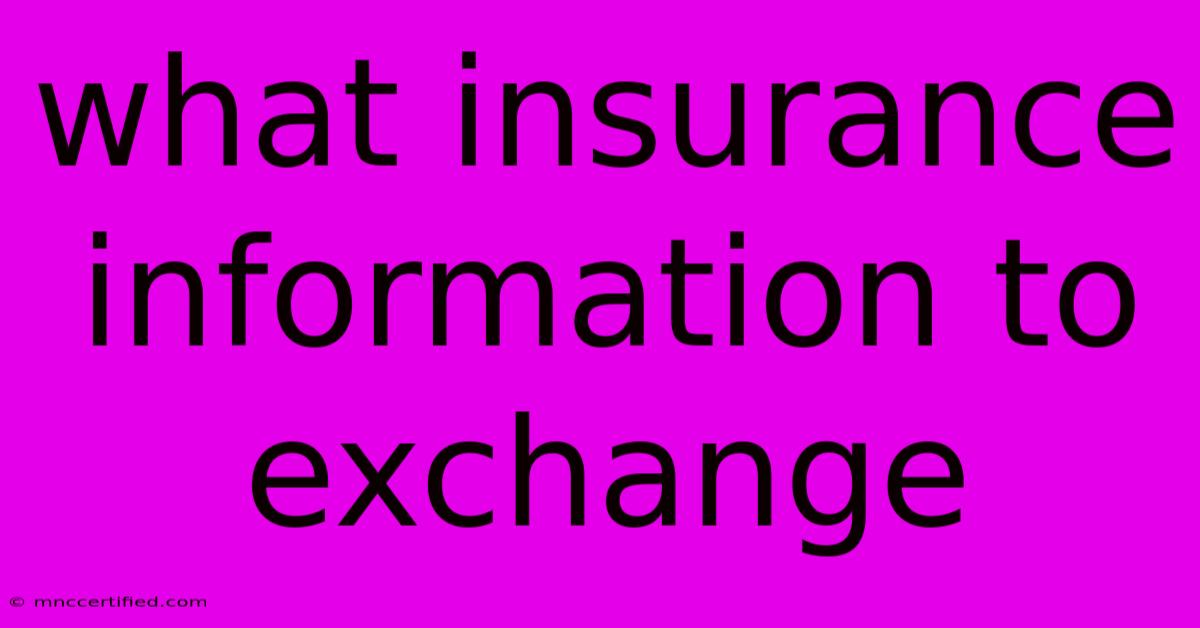What Insurance Information To Exchange

Table of Contents
What Insurance Information to Exchange After an Accident: A Comprehensive Guide
Accidents happen, and when they do, it’s crucial to know what insurance information to exchange. This ensures smooth claims processing and prevents any delays or complications down the road. Here’s a detailed guide outlining the essential information to gather after an accident:
Essential Information for a Smooth Claims Process
1. Driver’s License Information:
- Full Name: The complete legal name of the other driver(s) involved.
- Driver's License Number: This uniquely identifies the driver and their driving record.
- State of Issuance: Knowing where the license was issued helps verify its legitimacy.
2. Insurance Information:
- Insurance Company Name: The name of the other driver's insurance provider.
- Policy Number: This number allows insurers to quickly access the relevant policy details.
- Contact Information: Phone number and email address for contacting the insurance company.
3. Vehicle Information:
- Vehicle Make and Model: The specific make, model, and year of the other driver's vehicle.
- License Plate Number: This number identifies the vehicle and helps track its ownership.
- Vehicle Identification Number (VIN): A unique identifier for the vehicle, crucial for verifying its details.
4. Contact Information:
- Name: The full name of the other driver(s).
- Phone Number: A current and reliable phone number to stay in contact.
- Address: The address of the other driver(s) for future communication.
Additional Information for Complete Coverage:
- Witness Information: If there were any witnesses to the accident, collect their names and contact information.
- Police Report Number: If the police were called to the scene, obtain the report number for documentation.
- Photos of the Accident: Capture clear photos of the damage to both vehicles, the accident scene, and any relevant road signs.
- Medical Information: If you or anyone else sustained injuries, note the details of the injuries and any medical treatment sought.
Best Practices for Exchanging Information:
- Remain Calm: Keep your emotions in check and maintain a professional and courteous demeanor.
- Document Thoroughly: Use a notepad or your phone to record all the details accurately.
- Exchange Information Directly: Avoid using third parties or intermediaries to exchange information.
- Take Photos: Document the accident scene and vehicle damage thoroughly.
- Seek Professional Advice: Consult with your insurance agent or a legal professional if you have any doubts or concerns.
Remember, your safety is paramount. If you or anyone else involved in the accident is injured, seek medical attention immediately.
Why is Exchanging Insurance Information Important?
- Facilitates Claims Filing: Having all the necessary information ensures a smooth and efficient claims process.
- Protects Your Rights: Proper documentation safeguards your legal rights and ensures fair compensation.
- Prevents Delays: Accurate information reduces the chances of delays and disputes during the claims process.
By adhering to these guidelines and exchanging the required information, you can ensure a smoother and more efficient claims process, ultimately saving yourself time, effort, and potential legal hassles.

Thank you for visiting our website wich cover about What Insurance Information To Exchange. We hope the information provided has been useful to you. Feel free to contact us if you have any questions or need further assistance. See you next time and dont miss to bookmark.
Featured Posts
-
Rapper Bhad Bhabie Diagnosed With Cancer Speaks Out
Nov 09, 2024
-
Heretic Movie Ending A Religious Critique
Nov 09, 2024
-
Putin Reacts To Trump Win Offers Cooperation
Nov 09, 2024
-
Roberts Diamond Bond Protective Shield
Nov 09, 2024
-
Archers Icon June Spencer Dead At 105
Nov 09, 2024